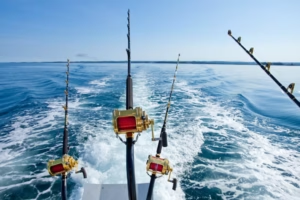According to the U.S. Coast Guard, boating fatalities nationwide totaled to 658 in 2017. That’s a 6.1% decrease from the previous year. Recreational boating injuries decreased by 9.4% as well. Despite these improvements, new boaters still need to remain aware. Boat safety tips are nothing to ignore. Otherwise, someone might fall overboard or receive an injury. Here are the top boat safety tips you should know before a day out at sea. In addition to learning these tips yourself, make sure your friends and family understand them as well.
Then, you and your crew can have a fun day on the water.
Make it a safe journey with these seven tips for proper boat safety.

1. Don’t Drink & Steer
The first step to a safe day on the water is to make sure you don’t drink and steer. Like drinking and driving a car, drinking and boating is dangerous for the driver and any passengers. In fact, drinking and boating can lead to serious legal consequences as well.
Many of the boating-related fatalities that occur are a result of drinking and boating.
Operating a boat while under the influence of alcohol is illegal in all 50 states. Known as a BUI, it’s also considered a federal crime. Most states consider a .08% blood alcohol level acceptable while operating a boat.
That’s the same blood alcohol level for driving under the influence (DUI).
Most women will reach this blood alcohol level after two drinks. Most men will reach it after five. However, you might reach this level sooner if:
- You haven’t eaten much that day
- You’re taking certain medications
- Your metabolism doesn’t process alcohol quickly
- You’re dehydrated
Instead of risking it, don’t get behind the wheel of any vehicle while under the influence.
Penalties for boating under the influence include:
- A large fine
- Loss of boating privileges
- Jail time
- Financial restitution for any damages of injuries
- Felony conviction
- Completion of an alcohol or boating safety course
Drinking while under the influence will impair your cognitive abilities and judgment. It’s just as dangerous on the water as it is on the road. If you’re steering the ship, set the beer aside.
2. Safety First
It’s estimated that life jackets have saved over 80% of boating fatality victims. One of the top boat safety tips to remain aware of is always wear a life jacket.
Some states only require you to keep a life jacket accessible. However, if an accident does occur, you likely won’t have time to put a life jacket on. Instead, purchase modern life jackets for your passengers and keep them on at all times.
Modern life jackets are compact, thin, and flexible, making them more comfortable.
If you have any children on board, make sure they’re wearing specially-sized jackets. These jackets are appropriate for their weight range. They’ll fit properly without allowing them to slip through.
An adult-sized life jacket won’t work for a child.
Before you go out to sea, make sure to test your child’s life jacket to ensure is works properly. This will also give your child the chance to adapt to wearing one.
3. Preparation is Key
The total cost of damages caused by boating accidents amounted to $46 million in 2017. You can avoid paying damages by preparing ahead of time.
Before you decide to own a boat, use these boat safety tips:
- Understand the specific boating laws in your state
- Have a U.S. Coast Guard Auxiliary perform a free Vessel Safety Check (VSC) on your boat
- Have a float plan, which includes where you’re going and when you intend to return
- Perform a pre-boarding boat safety check
You should email your float plan to a friend or family member who isn’t going boating with you. That way, they can start a search and rescue in case something goes wrong.
During your pre-boarding boat safety check, make sure you have a full tank of gas. You’ll also want to check the:
- Engine oil levels
- Transmission fluid levels
- Battery charge
- Full fluid levels
After refueling, make sure you don’t smell fumes after running the blower.
Have your operator’s certificate, license, or any other registration for your boat on board, just in case. Now you’re prepared for anything.
4. Watching the Weather
Before you leave the dock, make sure to check the local weather and the weather for your destination. Remember, the weather can change rapidly. Bring a radio for you to keep track of weather changes while you’re on the water.
5. Practice Propeller Safety
Before you leave, practice proper propeller safety with your passengers.
First, make sure everyone is accounted for on the boat. Walk around the boat to ensure no one is in the water. You don’t want to start the engine if anyone went overboard.
Let your passengers know where the propellers are located, and that they’re dangerous.
Place any children onboard away from the propellers.
If someone does fall overboard, stop the boat immediately. Shut off the engine if you’re approaching anyone in the water as well.
6. Remain Mindful of Others
You’re not the only one out at sea. In order to maintain proper boat safety, it’s important to remain mindful of any boaters or swimmers on the water. Keep a safe distance when you can.
Following any directions or signs you see. Make sure to follow the rules that are listed by the local authorities as well.
When you’re near any boats, the shore, or swimmers, keep your wake low.
7. Overboard Emergencies
It’s important to know what to do if someone goes overboard. Here are our boat safety tips for such an emergency:
- Turn off the motor and propellers
- If everyone has gone overboard while the propellers are active, get everyone away from the boat
- Remain calm
- Use your life jacket to float without exerting too much energy
- Make sure everyone is safe
- If you don’t have a life jacket, look for another floatation device
Then, try to get everyone to float back to safety.
Boat Safety Tips with Gulfstream Boat Club
Ready for a day out at sea? With these seven boat safety tips, you’re nearly ready. Don’t forget to pack sunscreen while enjoying that Florida sun.
Need a place to dock? Contact us for a free quote!
#Safety #BoatClub #SafetyChecklist #BoatingSafetyTips #BoatSafety #SafetyFirst #FloridaBoating


